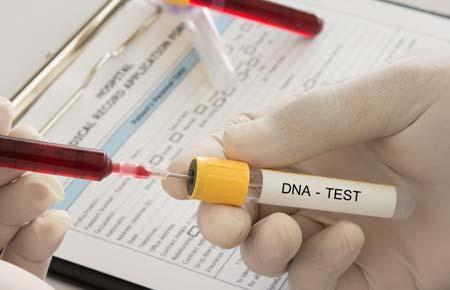Establishing Paternity Through Genetic Testing in Illinois
 In the state of Illinois, a man is only legally presumed to be the father of a child if the mother was married or in a civil union with him when the child was born or within 300 days before the child was born. If the mother was not married when the child was born, the man she names as the father of the child is then referred to as the alleged father. That man will only become the legal father after one of three things happens:
In the state of Illinois, a man is only legally presumed to be the father of a child if the mother was married or in a civil union with him when the child was born or within 300 days before the child was born. If the mother was not married when the child was born, the man she names as the father of the child is then referred to as the alleged father. That man will only become the legal father after one of three things happens:
- Both parents complete and sign a Voluntary Acknowledgement of Paternity form when or soon after the child is born;
- An administrative paternity order is entered into by a child support agency; or
- An order of paternity has been entered in court by a judge.
If the father contests the paternity of the child, the mother will then have to file a paternity suit that seeks to establish a parent-child relationship between the father and the child. Once you enter into a paternity suit, the judge will more-than-likely order the mother, the alleged father and the child to submit to genetic testing.
Understanding Genetic Testing
Genetic testing is important when you are attempting to establish paternity because it is extremely accurate. When a paternity suit is filed, the judge will order the mother, the alleged father and the child to submit to genetic testing to find out if the alleged father is the biological father. Every person has their own set of genes, which contains DNA. A child gets half of their genes from their mother and half of their genes from their father, which means that portions of the child’s DNA should match portions of both the father’s and the mother’s DNA. DNA tests work by matching up the child’s DNA with both the mother’s and father’s DNA. If the child’s DNA does not match that of the alleged father’s, then that man is ruled out as being the child’s father.
Types and Accuracy of Genetic Testing
There are a couple of ways you can test the DNA of a person. The most common ways are using a blood sample or a cheek swab, though the cheek swab is usually favored. If the mother is attempting to establish paternity before the child is born, she will have to allow blood to be drawn from the child in utero in order to test it. If the man being tested is not the child’s father, the test will prove that with 100 percent certainty. If the test results in a match, there is 99.9 percent certainty that the man is the child’s father.
Contact a DuPage County Paternity Lawyer
Paternity can be a long and argumentative process, which is why you would be smart to hire a knowledgeable Aurora, IL paternity attorney to help. At The Law Office of Matthew M. Williams, P.C., we can represent you throughout the paternity establishment process. Call our office today at 630-409-8184 to schedule a consultation.
Source:
https://www.illinois.gov/hfs/SiteCollectionDocuments/HFS1759.pdf

 630-409-8184
630-409-8184













